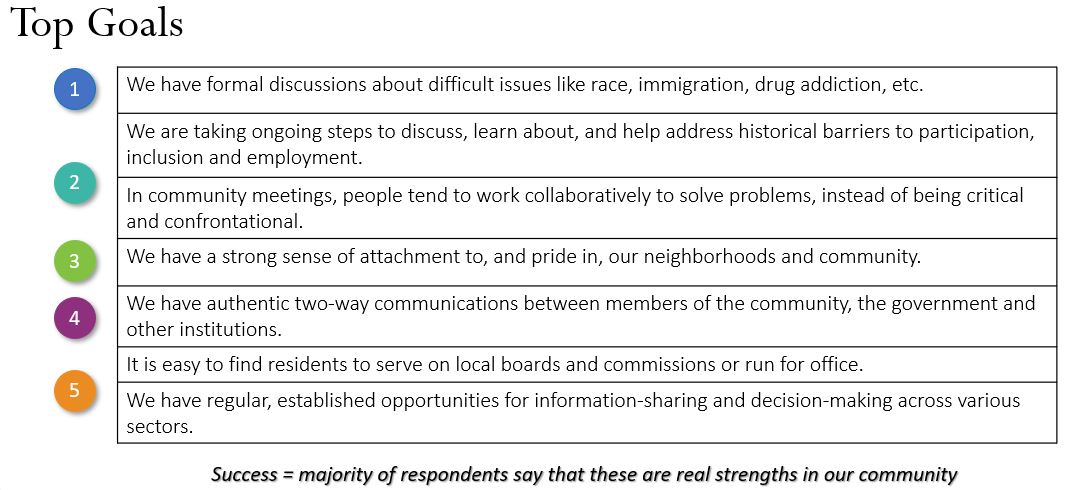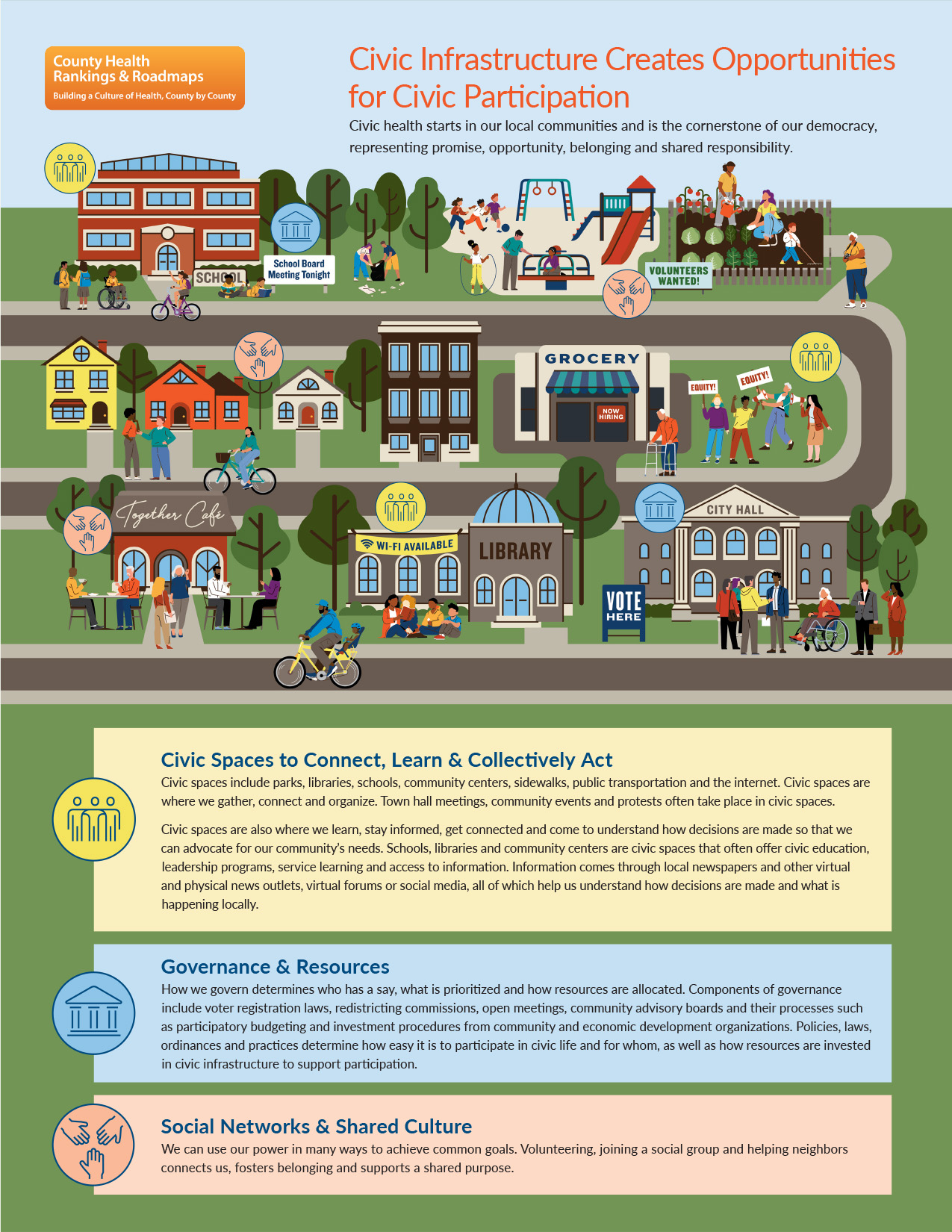Civic Health
What is Civic Health?
Civic health is the degree to which citizens participate in their communities, from local and state governance to interactions with friends or family. Civic health relates to the overall well-being of neighborhoods, communities, states and the nation (National Conference on Citizenship).
It's made up of two elements:
- Civic Infrastructure: the spaces such as schools, parks and libraries that help us stay connected and policies and practices that foster belonging, making civic participation possible
- Civic Participation: the ways people engage in community life to improve conditions and shape the community’s future, whether through political activities such as voting and advocacy, or community activities such as volunteering and mentoring
Why Does it matter?
Data reveals that places with more structural barriers to civic health are more likely to show signs of diminished civic participation, fewer social and economic opportunities and worse health outcomes.
Efforts to strengthen civic health lead to much better outcomes.
Research shows:
- A positive relationship between civic engagement and economic resilience.
- When previously disenfranchised groups build power and express their will through voting and advocacy, the policies that followed benefited the health and well-being of all.
- Progress is made toward health equity when all people are heard and have meaningful participation in decision making processes.
Civic Health in the Dan River Region
Help us better understand our region's civic strengths and where there may be opportunities for improvement.
The Civic Index, developed by the National Civic League, measures a community's civic capital - the formal and informal relationships, networks, and capacities that communities use to make decisions and solve problems.
This short questionnaire should take less than 10 minutes to complete. Your responses will help us develop strategies to improve the civic health and overall wellbeing of the communities in our region.
If you would prefer to fill out a paper copy of the Index, contact any Chapter Coordinator.
What's the status of this work?
Since early Fall 2023, The Health Collaborative has continued to engage the community in discussions and activities related to civic health - including the Civic Index.
- October 26th: Regional Collaborative Meeting
- Shared the results and key findings from the Civic Index with our partners. View the summary HERE.
- Asked participants to vote for the goals they would most like to work toward. See responses below.

- November 1st: Policymaker Breakfast
- Convened regional policymakers and community leaders to share the connection between civic health and community health. Shared research and case studies demonstrating the health, social, and economic impacts of advancing civic health in local communities.
- Had policymakers complete the Civic Index
- Share the results and key findings from the Civic Index responses collected from the community
- Asked policymakers to vote on the top two goal categories they would most like to work on
- Ongoing: Civic Health and Leadership Work Group
- A group of community residents and leaders who are continuing to learn about civic health and leadership and what it will take to advance this work in our region
- They are working to develop specific strategies for the communities in our region
- March 2024 - Health Summit
- Civic Health will be part of the theme of next year's Health Summit - more details coming soon!
Advancing civic health requires continuous learning and engagement. The more people who are involved and able to share their perspectives and experiences, the more successful we will be. So, please continue to complete and share the Civic Index and to participate in Health Collaborative meetings and events! All of the input you provide continues to guide and inform this work.
We know that building leadership and capacity and strengthening civic health go hand in hand, so we feel that the Regional Health Collaborative is well-positioned to lead this work. While our local chapters will continue to identify and develop collaborative strategies to address specific health equity issues, we believe that our regional effort to strengthen civic health will help to complement the chapters' work and make it even more impactful.
Learn More
Explore the following reports:
- Cultivating Civic Infrastructure and Participation for Healthier Communities - County Health Rankings & Roadmaps
- Civic Capital - National Civic League
Check out the In Solidary Podcast and their second series focused on Civic Health

Communities that have strong civic health have...
- Engaged Residents - They encourage residents to play a more active role in shaping decisions. Residents work to solve problems rather than waiting for government to solve their problems.
- Inclusive Leadership - They cultivate and support leaders from all backgrounds and diverse perspectives.
- Collaborative Institutions - They effectively collaborate across sectors.
- Willingness to Address Diversity and Equity - They address diversity and equity and move towards better outcomes for all.
- Authentic Communication - They support credible, valuable information moving between residents, institutions and other stakeholders.
- Culture of Engagement - They effectively engage the residents most affected by particular problems create stronger and more relevant programs, policies, and efforts.
- Shared Vision and Values - They create a shared vision and values from which aligned strategies emerge.




